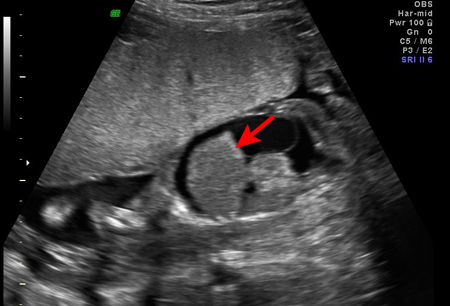Resumen
Definición
Anamnesis y examen
Principales factores de diagnóstico
- presencia de factores de riesgo
Factores de riesgo
- antecedentes de un feto RhD positivo en una madre RhD negativa
- hemorragia fetomaterna
- procedimientos fetales invasivos
- traumatismo placentario
- aborto
- multiparidad
- omisión de la inmunoprofilaxis Rh
- versión cefálica externa
- embarazo molar
- embarazo ectópico
Pruebas diagnósticas
Primeras pruebas diagnósticas para solicitar
- grupo sanguíneo materno
- cribado de anticuerpos Rh séricos maternos
Pruebas diagnósticas que deben considerarse
- título de anticuerpos séricos maternos
- grupo sanguíneo paterno
- cigosis paterna
- ultrasonido fetal
- Velocimetría Doppler de la arteria cerebral media fetal (velocidad sistólica pico)
- determinación del grupo sanguíneo fetal (por amniocentesis o circulación maternal)
- evaluación directa de la anemia fetal
- prueba de rosetas
- prueba de Kleihauer-Betke/citometría de flujo
Algoritmo de tratamiento
madre RhD negativa no sensibilizada
madre RhD negativa sensibilizada
neonato con eritroblastosis
Colaboradores
Autores
Andrew D. Hull, MD, FRCOG, FACOG
Professor of Clinical Obstetrics, Gynecology, and Reproductive Sciences
Director, UC San Diego Maternal-Fetal Care and Genetics
Division of Maternal-Fetal Medicine
Department of Obstetrics, Gynecology, and Reproductive Sciences
University of California San Diego
La Jolla
CA
Divulgaciones
ADH declares that he has no competing interests.
Agradecimientos
Dr Andrew D. Hull would like to gratefully acknowledge Dr Karen Fung-Kee-Fung and Dr Felipe Moretti, previous contributors to this topic.
Divulgaciones
KFKF is an author of a reference cited in this topic. KFKF and FM declare that they have no competing interests.
Revisores por pares
Alan Cameron, MD
Honorary Professor of Medicine
University of Glasgow
Glasgow
UK
Divulgaciones
AC is an author of several references cited in this topic.
Liakat Ali Parapia, MD, FRCP
Consultant Hematologist
Bradford Teaching Hospitals NHS Trust
Yorkshire Clinic
Bingley
Bradford
UK
Divulgaciones
LAP declares that he has no competing interests.
Kenneth J. Moise, Jr., MD
Professor of Obstetrics and Gynecology
Texas Children's Fetal Center
Baylor College of Medicine/Texas Children's Hospital
Houston
TX
Divulgaciones
KJM declares that he has no competing interests.
Agradecimiento de los revisores por pares
Los temas de BMJ Best Practice se actualizan de forma continua de acuerdo con los desarrollos en la evidencia y en las guías. Los revisores por pares listados aquí han revisado el contenido al menos una vez durante la historia del tema.
Divulgaciones
Las afiliaciones y divulgaciones de los revisores por pares se refieren al momento de la revisión.
Referencias
Artículos principales
Brennand J, Cameron A. Fetal anaemia: diagnosis and management. Best Pract Res Clin Obstet Gynaecol. 2008 Feb;22(1):15-29. Resumen
American College of Obstetrics and Gynecology. ACOG practice bulletin no. 181: prevention of Rh D alloimmunization. Obstet Gynecol. 2017 Aug;130(2):e57-70. Resumen
American Congress of Obstetrics and Gynecology. ACOG practice bulletin no. 192: management of alloimmunization during pregnancy. Obstet Gynecol. 2018 Mar;131(3):e82-90. Resumen
Qureshi H, Massey E, Kirwan D, et al. BCSH guideline for the use of anti-D immunoglobulin for the prevention of haemolytic disease of the fetus and newborn. Transfus Med. 2014 Feb;24(1):8-20.Texto completo Resumen
Visser GHA, Thommesen T, Di Renzo GC, et al. FIGO/ICM guidelines for preventing Rhesus disease: a call to action. Int J Gynaecol Obstet. 2021 Feb;152(2):144-7.Texto completo Resumen
Artículos de referencia
Una lista completa de las fuentes a las que se hace referencia en este tema está disponible para los usuarios con acceso a todo BMJ Best Practice.

Diferenciales
- Hidropesía fetal no inmune
- Infección por parvovirus
- Enfermedad hemolítica no RhD
Más DiferencialesGuías de práctica clínica
- ACOG clinical practice update: paternal and fetal genotyping in the management of alloimmunization in pregnancy
- ACOG clinical practice update: Rh D immune globulin administration after abortion of pregnancy loss at less than 12 weeks of gestation
Más Guías de práctica clínicaInicie sesión o suscríbase para acceder a todo el BMJ Best Practice
El uso de este contenido está sujeto a nuestra cláusula de exención de responsabilidad